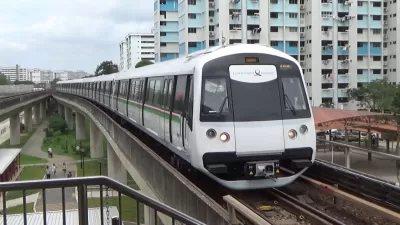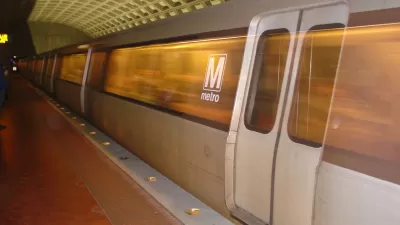Capital investments could get more expensive, if Congress forces transit systems to buy American.
"Yesterday, the White House issued an official endorsement of a version of language banning mass transit rolling stock procurements from Chinese manufacturers that includes buses as well as railcars, in a blow to electric bus manufacturer BYD," according to an article by Jeff Davis.
The endorsement is found in a letter [pdf] from the acting director of the Office of Management and Budget that explains the Trump administration's position on matters still to be negotiated as Congress hammers out a new National Defense Authorization Act for fiscal year 2020.
"The House has passed H.R. 2500 [pdf] and the Senate has passed S. 1790 [pdf], and both bills contain very similar provisions prohibiting the use of federal mass transit funds for the purchase of transit rolling stock from manufacturers owned, or subsidized by, the Chinese government, and discouraging transit agencies from using non-federal funding for such purchases," according to Davis.
Davis explains in more detail the legal language that would change procurement for transit agencies in the United States:
The language is mainly targeted at Chinese state-owned rail manufacturer CRRC, which has won several major rail car procurements (Boston, Chicago, Los Angeles) with ultra-low bids in the last few years. But there is one key difference between the provisions – the House provision (section 896 of H.R. 2500) applies only to “rail rolling stock procurements” while the Senate language (section 6015 of S. 1790) applies to all rolling stock procurements, which means that the Senate language also applies to procurement of buses while the House language does not. BYD, while not owned by the Chinese government, does receive some subsidies from them, which would make them subject to the ban.
There's more on the political ramifications of the potential ban on Chinese-manufactured buses in the article. Davis also wrote a report in September 2018 about the consequences of such a ban on transit operations and the economy.
FULL STORY: White House Endorses Ban on Chinese Bus and Rail Procurements

Alabama: Trump Terminates Settlements for Black Communities Harmed By Raw Sewage
Trump deemed the landmark civil rights agreement “illegal DEI and environmental justice policy.”

Study: Maui’s Plan to Convert Vacation Rentals to Long-Term Housing Could Cause Nearly $1 Billion Economic Loss
The plan would reduce visitor accommodation by 25% resulting in 1,900 jobs lost.

Why Should We Subsidize Public Transportation?
Many public transit agencies face financial stress due to rising costs, declining fare revenue, and declining subsidies. Transit advocates must provide a strong business case for increasing public transit funding.

Paris Bike Boom Leads to Steep Drop in Air Pollution
The French city’s air quality has improved dramatically in the past 20 years, coinciding with a growth in cycling.

Why Housing Costs More to Build in California Than in Texas
Hard costs like labor and materials combined with ‘soft’ costs such as permitting make building in the San Francisco Bay Area almost three times as costly as in Texas cities.

San Diego County Sees a Rise in Urban Coyotes
San Diego County experiences a rise in urban coyotes, as sightings become prevalent throughout its urban neighbourhoods and surrounding areas.
Urban Design for Planners 1: Software Tools
This six-course series explores essential urban design concepts using open source software and equips planners with the tools they need to participate fully in the urban design process.
Planning for Universal Design
Learn the tools for implementing Universal Design in planning regulations.
Smith Gee Studio
Alamo Area Metropolitan Planning Organization
City of Santa Clarita
Institute for Housing and Urban Development Studies (IHS)
City of Grandview
Harvard GSD Executive Education
Toledo-Lucas County Plan Commissions
Salt Lake City
NYU Wagner Graduate School of Public Service





























